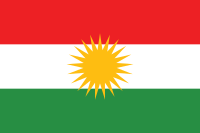Kurdish National Council
 | |
 | |
| Abbreviation | KNC |
|---|---|
| Formation | 26 October 2011 (151 months ago) |
| Purpose | Kurdish autonomy |
| Headquarters | Erbil |
| Location | |
Region served | Western Kurdistan |
Membership | 26 members (General Assembly) |
Chairman/President | Feysel Yusuf |
Spokesperson | Khair al-Dien Murad |
Parent organization | Kurdish Supreme Committee Syrian National Coalition[1] |
 |
|---|
The Kurdish National Council (KNC, Kurdish: Encûmena Niştimanî ya Kurdî li Sûriyê, ENKS; Arabic: المجلس الوطني الكوردي Al-Majlis Al-Watani Al-Kurdi) in Syria is a Kurdish political organization involved in the Syrian Civil War.[2][3]
The Kurdish National Council was founded in Hawler on 26 October 2011, under the sponsorship of Kurdish Regional Government President Massoud Barzani, following the earlier creation of the Syrian National Council. The organisation was originally composed of 11 Syrian Kurdish parties, however by May 2012 this had grown to 15. The key difference between the KNC and the SNC is over their approach to the issue of decentralization, with the KNC pressing for Kurdish autonomy, whereas the SNC has rejected anything more than administrative decentralization.[4]
Several KNC parties have also on occasion come into conflict with another Kurdish group, the Democratic Union Party, or PYD.[5] In order to reduce tensions, Massoud Barzani mediated between the two groups in July 2012 at a diplomatic meeting in Hawler. As a result, the PYD joined with the Kurdish National Council to form the Kurdish Supreme Committee along with a popular defence force to defend Syrian Kurdistan.[6] Under the agreement, cities that fall under the control of Syrian Kurdish forces will be ruled jointly by the PYD and the KNC until an election can be held. Despite the agreement before the groups, there remain allegations from the Kurdish Union Party that the PYD has forced buildings run by the KNC, which fly the Kurdish flag, to replace it with the Alaya rengîn flag, which is used by the PYD. The PYD has apparently been able to do this through will because unlike most other Kurdish groups, the PYD is the poples,[7] due in part to the fact that it ensures, at times forcibly, that no other groups maintain any significant armed wing like the YPG.[clarification needed]
List of constituent parties
| Name | Leader |
|---|---|
| Azadi Kurdish Party in Syria | Mustafa Jumaa |
| Azadi Kurdish Party in Syria | Mustafa Oso |
| Kurdish Democratic Equality Party in Syria | Aziz Dawe |
| Kurdish Democratic National Party in Syria | Tahir Sfook |
| Kurdish Democratic Party in Syria | Abdul Rahman Aluji |
| Kurdish Democratic Party in Syria | Nasreddin Ibrahim |
| Kurdish Democratic Party in Syria | Feysel Yusuf |
| Kurdish Democratic Progressive Party in Syria' | Hamid Darwish |
| Kurdish Democratic Unity Party in Syria (Yekiti) | Sheikh Ali |
| Kurdish Democratic Wifaq Party | Nash’at Muhammad |
| Kurdish Left Party in Syria | Muhammad Musa |
| Kurdish Yekiti Party in Syria | Ismail Hamo |
| Kurdistan Democratic Party of Syria | Dr. Abdul Hakim Bashar |
| Syrian Democratic Kurdish Party | Sheikh Jamal |
| Yekiti Kurdistani | Abdul Basit Hamo |
See also
References
- ^ "PYD Leader Skeptical of Kurdish Agreement With Syrian Opposition". Rudaw.net. 9 March 2013. Retrieved 20 January 2014.
- ^ "'Last chance' to avoid civil war in Syria: Annan". Agence France-Presse. 2012-05-09. Retrieved 2012-07-24.
- ^ "Political Groups to Run Liberated Kurdish Cities in Syria Through Joint Committee". Rudaw. 2012-07-20. Retrieved 2012-07-24.
- ^ "The Kurdish National Council in Syria". Carnegie Middle East Center. Retrieved 2012-07-24.
- ^ "Syrian Kurdish moves ring alarm bells in Turkey". Reuters. Retrieved 2012-07-25.
- ^ "Barzani Unites Syrian Kurds Against Assad". Al-Monitor. Retrieved 2012-07-25.
- ^ "Liberated Kurdish Cities in Syria Move into Next Phase". Rudaw. Retrieved 2012-07-25.
